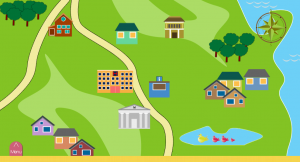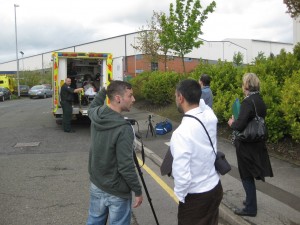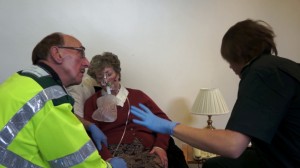DEMEC Poster: Serious Gaming Doesn’t Have To Be Seriously Expensive!
Background
Do computer games have a place in healthcare education and training? The same principles which make games so addictive and compelling can be applied to learning content, improving learner engagement and improving learning outcomes and knowledge retention. Developing effective game based learning can be seriously expensive, but it doesn’t have to be!
Summary of work
In the autumn of 2012, working with Yorkshire Ambulance Service, I set out to prove that serious games in education no longer need to be the preserve of big business. This case study documents my experiences, my tips on creating a serious game and demonstrates that you don’t need a six figure budget to produce an engaging and effective piece of games-based learning.
Project WebWise was a European endeavour to improve and innovate with web 2.0 technologies in public health education. My aim for the UK project was to educate ambulance crews in recognising the signs of social isolation in vulnerable adults which was achieved through the development of an educational “serious game”. With only a minimal budget and a lot of hard work from a dedicated group of individuals sacrificing evenings and weekends, we achieved a great result.
The learning is centred around a virtual community which introduces learners to a range of characters living in the fictitious town, through interactive timelines and video clips. Participants explore the environment in their own time with rewards for completing tasks in the game, such as visiting all the characters or exploring all the community buildings. Each character presents a short piece to camera as their introduction before learners are introduced to a scenario involving all the characters, which demonstrates examples of good and bad practice.
The concept was based on ideas used in UK Police training and the work of the University of Cumbria who have done some fabulous research into storytelling pedagogies for nurse education.
We created a “serious” eLearning game to improve awareness of patient dignity and respect with an aim of improving patient care. Incorporating video scenarios, rewards for completing objectives and reflective activities, learners were encouraged to complete the game to improve their patient care.
Developing the Game
We used the Lectora authoring tool to develop the materials, as we already had a licence for the software and some experience of using it. Lectora was great because it allowed us to achieve some fairly advanced techniques without having to rely on anyone with programming skills. This became the stage for all the content and the engine powering the game.
Graphics and images were created in-house using free tools such as Paint.net and GIMP.
The video scenes were filmed using a couple of cheap cameras purchased on the high street and edited using Corel Video Studio – cheap and cheerful but they did the job! The exotic filming locations chosen were an ambulance station and a disused car park.
Actors and crew were all volunteers who donated their spare time to the project, with varying levels of acting experience ranging from novice to professional.
We were also very lucky to be able to persuade local celebrity poet Ian McMillan to donate his time to narrate the introductory videos.
Summary of results
We asked learners (predominantly frontline ambulance staff) to submit a written reflection to a discussion forum after they had completed the learning so we could gauge reactions and monitor engagement. The game was well received and learners enjoyed the innovative delivery method, with one describing the gaming environment as “a refreshing change from the usual e-learning”. Our leaners were pretty forgiving even if the production quality didn’t quite match that of the BBC!
70% of learners judged the learning to be better than traditional linear e-learning courses with many citing the rewards and recognition of their achievements as the primary reason for the improvement. Learners were encouraged to submit a reflective post following the learning and these provided an insight into the way in which changes to behaviour could be judged.
Discussion and conclusions
Games based learning proved to be largely successful and while much more complex to develop, was relatively cheap to produce using in-house resources. Learner engagement was significantly improved using these techniques.
Top Tips for Creating Your Own Serious Game
Top Tip 1: Ask around for volunteers. You’ll be surprised at the number of budding actors and actresses out there! One of our actors (a real life paramedic) has since appeared in the Inspector Lynley Mysteries and Casualty.
Top Tip 2: See what equipment you already have available. Cameras from the high street and even smartphones can provide excellent results. Don’t forget your props – a couple of old rugs can transform a meeting room into a home.
Top Tip 3: Do your homework. A little research early on will help to make your characters, scenarios and the game much more believable when filmed and edited.
Top Tip 4: Reward Learners. Make sure that learners are provided with a (virtual) reward for completing tasks to encourage them to keep going!
Top Tip 5: Dare to dream big – why not? Be ambitious. Just because you don’t have a Hollywood budget doesn’t mean that you can’t achieve amazing results on a shoestring.
Top Tip 6: Enjoy yourself! This was a lot of fun to produce and proved that with a little hard work and a lot of enthusiasm, it is possible to create compelling and engaging stories that support learning outcomes on a minimal or even a zero budget.
Take home messages
The principles of the computer games industry can be applied to education and training, without a large budget and learner outcomes are improved.
Originally posted in December 2013 as part of the eLearning Network 24Tips and on Richard Price’s Blog.





